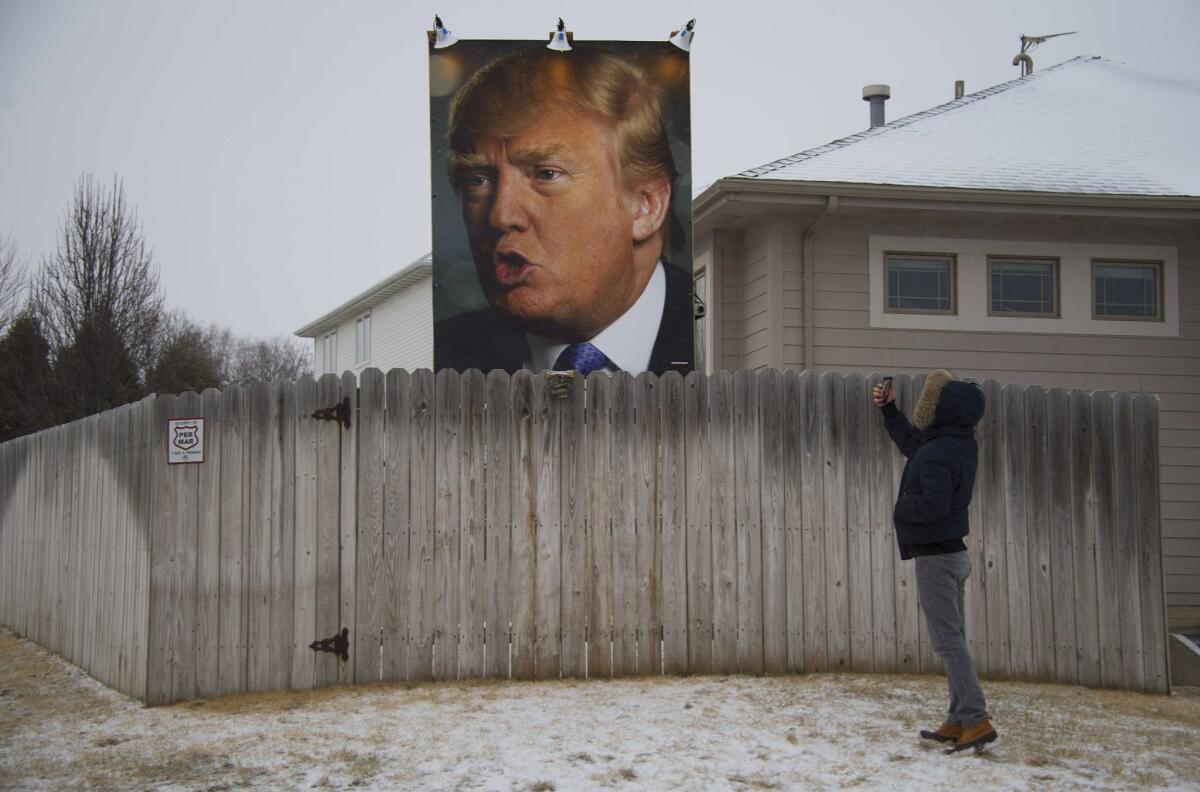Op-Ed: Who’s to blame for Donald Trump?

A giant poster of Republican presidential candidate Donald Trump stands on display in the backyard of a supporter’s residence in West Des Moines, Iowa on Jan. 25.
- Share via
Donald Trump stands astride our politics, comical, embarrassing and terrifying. The country’s pundits look upon him, and as one, they ask a single question: Whose fault is this anyway?
The answers are surprisingly varied. One of the more popular arguments is that Trump is a byproduct of rising inequality, and the bipartisan policies that have hollowed out the middle class over the last several decades. Bill Clinton’s open trade policies, George W. Bush’s tax cuts and the Obama administration’s bank bailouts, the argument goes, all helped the wealthy and immiserated everyone else. Following a hallowed American tradition, Trump has channeled widespread anger into anti-immigrant nativism and racism. In this view, Trump is the ugly mirror image of Bernie Sanders, whose anti-poverty campaign, Sanders’ supporters argue, is the only effective inoculation against Trumpism, present and future.
The flow of Trump theories is part and parcel of the Trump phenomenon, whereby massive disproportionate attention turns a vapid stunt candidate into a contender.
Another common opinion, articulated by the right-leaning journalist Josh Barro among others, is that Trump is the fault of the Republican Party. The GOP, Barro says, has spent so much time and effort attacking both Washington and the media that voters now trust only outsiders, neophytes and brazen know-nothing nonexperts. That has paved the way for folks like Herman Cain, Ben Carson, Newt Gingrich and now Trump to run campaigns to sell books, bilk donors or assuage their Trump-Tower-size egos.
Blaming the Republican Party as a whole is too nebulous for some pundits, who’d rather single out specific politicians for criticism. Trump is the fault of George W. Bush, because his failed presidency divided the GOP; or of Sen. Marco Rubio, because he’s such a losing loser who can’t energize anyone other than billionaire donors. He’s the fault of Jeb Bush’s super PAC, which spent millions attacking Rubio and just about nothing trying to bring down Trump; or of Gov. John Kasich, because he won’t drop out. Or, unexpectedly, Trump’s the fault of former House Speaker John A. Boehner who, according to CNN’s Tara Setmayer, compromised too much with Obama and made Republicans mad enough to vote for a racist bloviating clown.
If John Boehner doesn’t seem sufficiently far afield, what about President Obama? New York Times columnist Ross Douthat argues that Obama’s 2008 campaign, with it’s will.i.am video and soaring ephemeral rhetoric, created the context for reality star Trump to seize control of the political imagination. Josh Kraushaar at National Journal blames not Obama, but Sen. Al Franken, who after a disputed election in 2008 was finally seated late, giving Obama the 60-vote supermajority he needed to pass a stimulus, Obamacare and other nefarious liberal policies that created a poisoned partisan atmosphere of bitterness and recrimination in which Trump, weed-like and orange-haired, has flourished.
Or, for a completely different theory, try political scientist Daniel Drezner, who blames Trump’s rise on … political scientists. Many political scientists have subscribed to what they call the “party decides” theory, which states, more or less, that party insiders, not voters, control the nomination process. The GOP, Drezner argues, accepted the “party decides” model and so didn’t take the threat from Trump seriously enough. By the time they realized the political scientists were wrong, it was too late.
More predictably, commentators have blamed Trump on Fox News and Rush Limbaugh, who created an alternate-reality media bubble, dumbing down public discourse with climate denial and Benghazi conspiracy theories until Trump’s vast cluelessness on policy started to seem like a feature rather than a bug.
It’s churlish to just blame right-wing media, though, when you can wag a finger at journalists of every political persuasion. Trump has dominated TV news coverage, getting exponentially more than the rest of the Republican field, and at times outstripping the entire Democratic field as well. That much exposure means that he’s way ahead in name recognition and may well be the only candidate many Republican voters recognize. Even “Saturday Night Live” had him on to host. Pundits may not like Trump’s politics of hate, but they can’t get enough of his boisterous insult comedy and fabulous ratings. Celebrity makes the fascism go down easy.
And that leads us to the final people responsible for Trump’s rise: all those writing Trump-blame think pieces.
The flow of Trump theories is part and parcel of the Trump phenomenon, whereby massive disproportionate attention turns a vapid stunt candidate into a contender.
To say his name is to give him power, like Voldemort, but with Trump, steaks instead of snakes. Cast aspersions here or there as you will, but America made Trump. There’s plenty of blame to go round.
Noah Berlatsky edits the comics and culture website the Hooded Utilitarian and is the author of the book “Wonder Woman: Bondage and Feminism in the Marston/Peter Comics, 1941-1948.”
Follow the Opinion section on Twitter @latimesopinion and Facebook
A cure for the common opinion
Get thought-provoking perspectives with our weekly newsletter.
You may occasionally receive promotional content from the Los Angeles Times.






